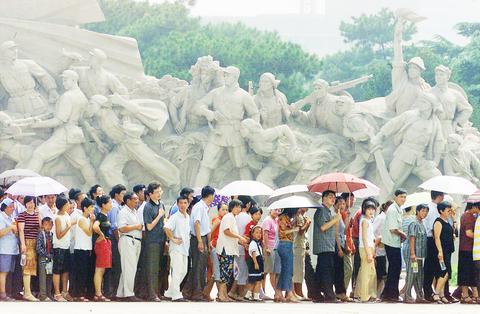The Chinese Foreign Ministry repeated its long-standing position yesterday that "there is only one China in the world and the mainland and Taiwan are both a part of China," as an initial response to Taiwan's President Chen Shui-bian's (陳水扁) remarks on Saturday.
Chen said that there is "one country on either side" (of the Taiwan Strait) and urged the public to seriously consider referendum legislation to allow 23 million Taiwanese to decide Taiwan's future.
Chen's comments sparked an immediate media frenzy as both the domestic and international media sought to interpret the remark and wondered what China's reaction would be.

PHOTO: REUTERS
Yesterday, a spokesman from China's Foreign Affairs Ministry told AFP and Reuters reporters that China would never tolerate an independent Taiwan.
"The separation of China's sovereignty and territorial integrity will never be tolerated," the spokesman said on condition of anonymity.
He said that a more official response would be issued by the Taiwan Affairs Office of China's State Council.
Some analysts have speculated that Beijing is buying time needed to integrate internal opinion before making a formal reaction.
The state-run China Central Television (CCTV) and XinHua News Agency both reported that Hong Kong's pro-Beijing newspapers carried stories warning that Chen's comments risked provoking the use of force by Beijing.
The pro-Beijing Wen Wei Po stated, "an official [in Beijing] reminded Chen Shui-bian and his partners not to play with fire again, not to wager the well-being of Taiwanese people in his gamble and not to lead Taiwan to a disaster."
Another Hong-Kong based pro-Beijing newspaper, Ta Kung Pao, carried a front page story with a spokesman from China's Taiwan Affairs Council reiterating that Taiwan was part of China, and any separatist move would not work.
Meanwhile, Taiwan officials said yesterday that the administration's cross-strait policy has not changed.
Vice Chairman of the Mainland Affairs Council Chen Ming-tong (
"China has never abandoned the use of force against Taiwan. It also continues to hamper Taiwan's diplomacy despite President Chen's repeated gestures of goodwill over the past two years," he said.
Chen Ming-tong stressed that the two countries can't ever replace or represent each other.
"President Chen's remarks merely reiterated this fact. The essence of Taiwan's cross-strait policy remains unchanged," he said.
In the private sector, responses were mixed.
Stanley Hsu (
"The status quo is the best solution. It is not the time for Taiwan and China talk about split or unification. Strong economic power can help promote our nation, not political status," Hsu said.
He stressed that the most important thing for the time being is boosting the nation's economy, and questioned why Chen would choose to make such bold comments now.
Hsu added that the remarks could make it more difficult for Taiwanese businesspeople to work in China.
But the president of the association's Guangdong Province branch, who spoke on condition of anonymity, said he is not worried about the president's rhetoric.
"We've gotten used to [Taiwan making provocative remarks toward China]. I think it has no influence on cross-strait relations. There shouldn't be any problem," he said.

Taiwanese can file complaints with the Tourism Administration to report travel agencies if their activities caused termination of a person’s citizenship, Mainland Affairs Council Minister Chiu Chui-cheng (邱垂正) said yesterday, after a podcaster highlighted a case in which a person’s citizenship was canceled for receiving a single-use Chinese passport to enter Russia. The council is aware of incidents in which people who signed up through Chinese travel agencies for tours of Russia were told they could obtain Russian visas and fast-track border clearance, Chiu told reporters on the sidelines of an event in Taipei. However, the travel agencies actually applied

Japanese footwear brand Onitsuka Tiger today issued a public apology and said it has suspended an employee amid allegations that the staff member discriminated against a Vietnamese customer at its Taipei 101 store. Posting on the social media platform Threads yesterday, a user said that an employee at the store said that “those shoes are very expensive” when her friend, who is a migrant worker from Vietnam, asked for assistance. The employee then ignored her until she asked again, to which she replied: "We don't have a size 37." The post had amassed nearly 26,000 likes and 916 comments as of this

New measures aimed at making Taiwan more attractive to foreign professionals came into effect this month, the National Development Council said yesterday. Among the changes, international students at Taiwanese universities would be able to work in Taiwan without a work permit in the two years after they graduate, explainer materials provided by the council said. In addition, foreign nationals who graduated from one of the world’s top 200 universities within the past five years can also apply for a two-year open work permit. Previously, those graduates would have needed to apply for a work permit using point-based criteria or have a Taiwanese company

The Shilin District Prosecutors’ Office yesterday indicted two Taiwanese and issued a wanted notice for Pete Liu (劉作虎), founder of Shenzhen-based smartphone manufacturer OnePlus Technology Co (萬普拉斯科技), for allegedly contravening the Act Governing Relations Between the People of the Taiwan Area and the Mainland Area (臺灣地區與大陸地區人民關係條例) by poaching 70 engineers in Taiwan. Liu allegedly traveled to Taiwan at the end of 2014 and met with a Taiwanese man surnamed Lin (林) to discuss establishing a mobile software research and development (R&D) team in Taiwan, prosecutors said. Without approval from the government, Lin, following Liu’s instructions, recruited more than 70 software